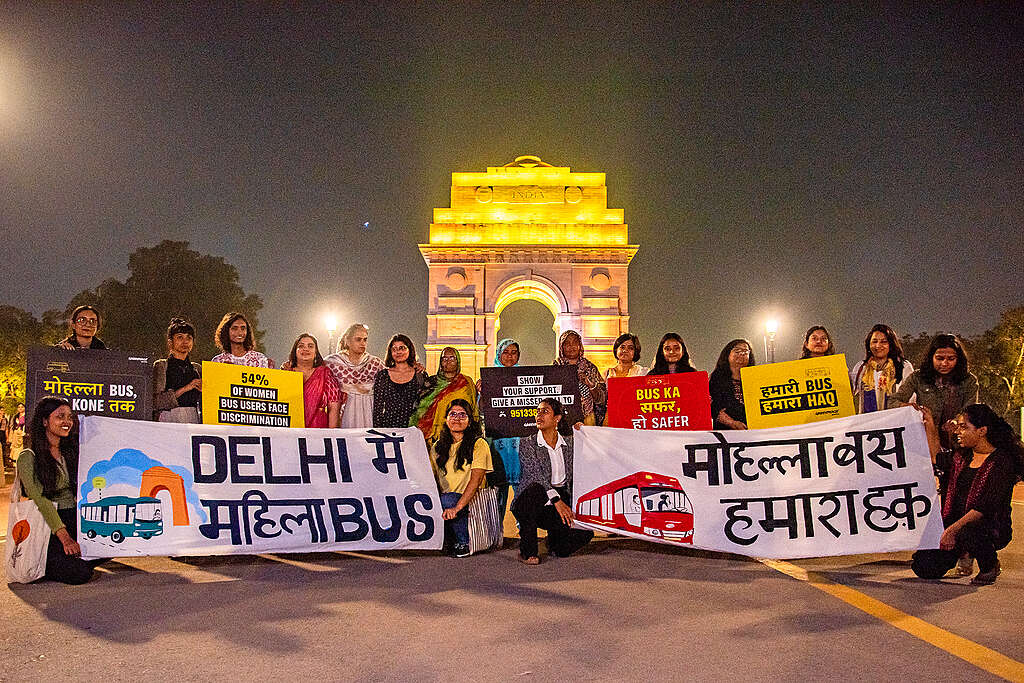
On the evening of October 27, Greenpeace India conducted an all-women Midnight Bus Tour featuring women from marginalised communities, journalists, researchers, influencers, social workers and Greenpeace volunteers to put a spotlight on the hindrances to night-time travel for women, primarily due to concerns around safety and accessibility of public transport. The women came together to celebrate their agency and freedom with a strong message against any form of gender-based discrimination in public mobility spaces. Through an evening of fun, leisure, conversations and songs—which featured singer-songwriter HeyDitty, the participants travelled across Delhi to assert their Right to Mobility and demand more buses on Delhi’s streets.
The tour was aimed at reclaiming public spaces for women, and it emphasised the need for Delhi’s public transport facilities to be safe and inclusive for all citizens. The participants on the bus delved into the varied challenges faced by women in accessing public mobility, especially the lack of security during night-time travel, offering a first-hand understanding of their experiences.
Historically, city planning in India has overlooked the mobility rights of women and gendered minorities, focusing primarily on men and the elite. Women rely heavily on walking and public transport for various needs, including employment, education, caregiving work, and leisure. The absence of adequate first-and-last mile connectivity in public transport significantly hinders the mobility of women, especially women from lower-income communities such as domestic workers, factory workers, and informal workers, who tend to travel shorter distances for work.
Concerns regarding personal safety, especially with prevalent episodes of harassment on public buses, create more hindrances for women and gender minorities. According to a recent report by the World Bank, 88 percent of surveyed women in Delhi report facing sexual harassment in public transport!
Sumedha Pal, a journalist who participated in the tour, said “Public transport for women has been a site of anxiety, fear and harassment. While public buses are now free for women in Delhi, this is not enough. The Midnight Bus Tour gave us an opportunity to experience our city in an inclusive and safe manner, while also enabling us to imagine sustainable cities—which count women as equal partners in policy and planning—as an achievable reality.”
Rifa Jawaid, another journalist and a participant of the tour, commented, “While I don’t usually rely on bus transportation, I would consider using buses if they were more accessible. Bike taxis and cabs might appear more convenient, but they aren’t sustainable options, and many women can’t afford them. Having more buses on our streets and ensuring the safety of all passengers would greatly simplify our commuting needs and bring more women onboard!”
The tour also echoed the insights from Greenpeace India’s recent report, “Halt for Women Bus Users in Delhi” The report sheds light on the various challenges encountered by Delhi’s women bus users such as buses not stopping for women commuters and women facing harassment and discrimination for travelling without charge due to the Delhi government’s free bus ride for women scheme. The scheme, which was introduced in 2019, has had a positive impact over the years, with women ridership increasing from 25 percent in 2020-21 to nearly 33 percent in 2022-23.
Reena Gupta, advisor to the Delhi government, commented on the findings of Greenpeace India’s report, “The Delhi government is organising training programmes for bus drivers due to the reported incidents. Providing training is crucial, as stopping the bus is necessary.” On the discrimination faced by women commuters for travelling without charge, Gupta added, “We have to come together and talk about these issues. Nothing is provided freely; it is taxpayers money, it is our money. This is a decision taken by the government which has provided a degree of economic freedom to many women. Observing our steps, other states are motivated to take similar actions.”
The Midnight Bus Tour serves as an important reminder for the need to increase investments in public buses. “It is time for urban social justice and sustainable mobility to take centre stage in our city-building process, and for public facilities to become people-centric and integrated—centring the needs of women in their everyday lives. Delhi needs to work for its citizens, and not against them. Just and equitable urban planning requires a multifaceted and gender-affirming approach. A public transport system that integrates safety, convenience and comfort for women and other gendered minorities is the key towards sustainable, effective and inclusive mobility.” said Avinash Chanchal, climate campaigner for Greenpeace India.
For further information or inquiries, please contact:
Avinash Kumar Chanchal, +91 8882153664, [email protected]
Nischita Verrendra, +91 9845828096, [email protected]
